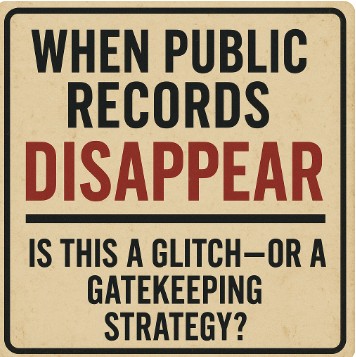
I typically don’t blog twice in a week but I received a reply to an email I had sent with the concern I raised about the quiet disappearance of historical records from several U.S. government websites. These weren’t obscure documents—these were public records I had accessed online before, copied, and cited. I even included the original URL and step-by-step directions. But today? “No such record exists,” I was told—unless, of course, I want to pay a fee and maybe someone at the agency will “research” it for me.
My library contact passed along to colleagues my email.
The reply? “She’s just being political.”
No. I’m being factual.
Here’s what’s happening, and it deserves attention:
- Government agencies are quietly removing access to records once available online.
- Researchers are being told those records never existed—even when we have the receipts.
- In some cases, agencies are offering to retrieve them for a price. Same record different paywall.
- When we raise concerns, we’re dismissed as overreacting or “politicizing” the issue.
This is not a partisan problem. It’s a public trust problem. If you don’t think this affects you, try sourcing a vital record for a family history project or accessing a land claim file for historical research. You might find a broken link—or worse, a dead end with a price tag.
If you think I’m exaggerating, feel free to test it yourself. If you’d like to email me, I’ll be happy to furnish the documents I accessed in the past—along with the original URLs. Try retrieving them now. See what you find.
Spoiler: It won’t be what it used to be.
This isn’t about politics. And if researchers stay silent, it’s only going to get worse. It’s about the deliberate erosion of public access, the rewriting of digital history, and the arrogance of institutions that think no one will notice.
Well, I noticed.
And I’ll keep noticing.
Because someone has to.
